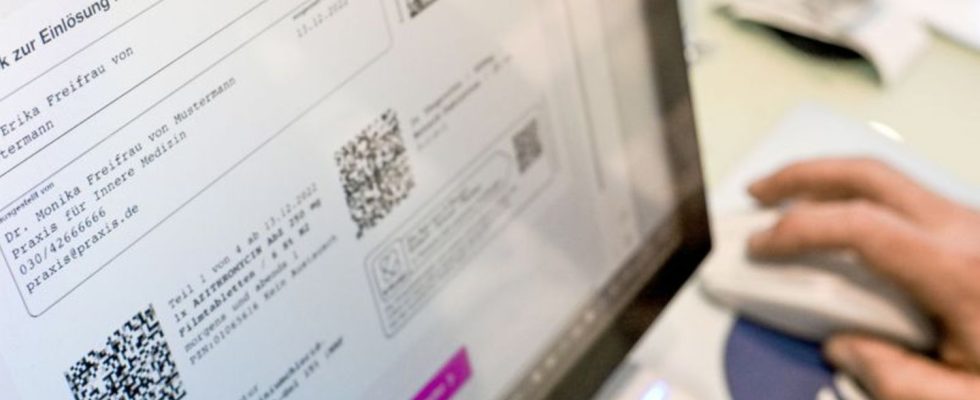Health
Bundestag should decide to boost e-prescriptions
E-prescriptions are expected to become standard and mandatory for practices at the beginning of 2024. photo
© Jens Kalaene/dpa
Germany is lagging behind when it comes to digitization in the healthcare system. Now there is a breakthrough for useful applications that will reach millions of patients and practices.
After years of delays, electronic prescriptions and digital patient files are set to become widely used in everyday life. This is the aim of the traffic light coalition’s legislative plans Bundestag should decide today.
Accordingly, e-prescriptions should become standard and mandatory for practices at the beginning of 2024. At the beginning of 2025, everyone with statutory health insurance should receive electronic patient files – unless they reject this for themselves. The use of combined health data for research is to advance according to the plans of Health Minister Karl Lauterbach (SPD).
Green health expert Janosch Dahmen spoke of a “long overdue update” for the digitalization of the healthcare system. “In the future, we will turn the previously unusable electronic patient file for a few into a personal health data room for everyone,” he told the German Press Agency. This means that not only all treating professions can see relevant information in one place, but also the patients themselves for the first time. “This finally eliminates fax machines and file folders and strengthens patient autonomy and patient rights.”
The head of the Techniker Krankenkasse, Jens Baas, said that the e-file must of course be part of the treatment every time you visit a doctor. It is important that it becomes more user-friendly. Logging in needs to be simplified. “As patients are used to with other apps, identification must also be possible in the file via facial scan or fingerprint,” said Baas. The file must be quick and easy for doctors to fill and should not waste time in their practices.
Specifically, two laws are about speeding up applications with practical benefits for patients.
E-patient records for everyone
A breakthrough is finally coming for digital patient files – as a personal data storage that accompanies you throughout your life with all doctors. The bundled data is also intended to avoid drug interactions and multiple examinations. E-files were introduced as an optional offer in 2021, but so far only around one percent of the 74 million people with statutory health insurance have one at all. The declared goal is 80 percent by 2025. The government is switching to the “opt-out” principle: According to the draft law, the health insurance companies should provide broad information and automatically set up an e-file for everyone by January 15, 2025 – unless you object .
The e-file with certain identification rules should be accessible via cash register apps. You should be able to decide for yourself what doctors can set and who can access what. First, an overview of medications should be available, followed by laboratory findings, among other things. If you change health insurance, you should be able to take your data with you.
E-prescription across the board
For some time now, e-prescriptions have been able to be redeemed using a special app or a printed QR code instead of the usual pink slip. But a larger-scale start was delayed several times due to technical problems. There is now an easier way to redeem it by inserting the insurance card into a reader at the pharmacy. By law, from January 1, 2024, it will be mandatory for doctors to issue prescriptions electronically.
The obligation actually existed from the beginning of 2022. However, the practices should now change because recently the conditions for this were not there everywhere. This includes a connecting device for the protected healthcare information highway. The e-prescriptions are stored on a central server and when the cash register card is inserted, the pharmacy is authorized to retrieve them from there. In the future, the e-prescription app will also be integrated into cash register apps.
Easier data research
Research using health data should also make progress. To this end, a law should make it possible to link data from various sources at a central access point – for example from cancer registries and health insurance companies. Data should be encrypted (pseudonymized). An opt-out model is again planned for data stored in e-patient files: You should initially have a setting for “data donations” for research purposes, which you can reject.

